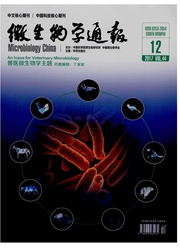

 中文摘要:
中文摘要:
【目的】构建脑膜炎大肠杆菌K1(Escherichia coli,E.coli K1)株E44的聚磷酸盐激酶1(Polyphosphate kinase 1,PPK1)基因敲除株,并对其生物学功能进行初步研究,为明确ppk1基因在E.coli K1株致脑膜炎机制中的作用奠定基础。【方法】利用自杀质粒pCVD442及基因同源重组技术敲除E.coli K1株E44中的ppk1基因,构建ppk1缺失突变株Δppk1;体外比较野生株和突变株在低营养及氧化压力情况下的生存能力;考察二者对人脑微血管内皮细胞(Human brain microvascular endothelial cells,HBMEC)的黏附能力;通过测定乳酸脱氢酶(Lactic dehydrogenase,LDH)释放活性,比较野生株和突变株对HBMEC的损伤效应。【结果】PCR及序列分析证实,突变株缺失全长ppk1基因。与野生株E44相比,ppk1突变株Δppk1在低营养环境中和氧化刺激条件下的生存能力明显降低。相对于E44,Δppk1对HBMEC的黏附能力减弱。与HBMEC孵育后,突变株孵育组HBMEC的LDH释放活性明显低于野生株孵育组。【结论】ppk1对E.coli K1株E44在低营养环境中的生存、抵抗氧化压力,以及黏附HBMEC和对细胞的毒性损伤有重要作用。
 英文摘要:
英文摘要:
[Objective] To construct the polyphosphate kinase 1 gene deletion mutant of Escherichia coli(E.coli) K1 strain E44 and explore the role of ppk1 in the pathopoiesis of meningitis E.coli K1.[Methods] The ppk1 gene was knocked out from the genome of E.coli K1 strain E44 by using suicide vetor pCVD442 and homologous recombination,and the mutant was named Δppk1.Then the survival ablities of E44 and Δppk1 in poor nutrition condition and oxidative stress were examined.The ability of the mutant adhering to human brain microvascular endothelial cells(HBMEC) was also compared with that of the wild type.The cytoge-netic toxic effects induced by Δppk1 and E44 were tested by using the lactic dehydrogenase testing kit.[Results] The ppk1 gene of the mutant had been knocked out and was confirmed by PCR and DNA sequencing.The ppk1 deletion mutant showed to be defective in adhesion ability to HBMEC and survival abilities under poor nutrition condition and oxidative stress.The damaging effects of HBMEC induced by Δppk1 were significantly less than that induced by E44.[Conclusion] The ppk1 gene plays an important role in E.coli K1 surviving in low nutrition and oxidative stress condition,adhering to HBMEC and inducing cell injury.
 同期刊论文项目
同期刊论文项目
 同项目期刊论文
同项目期刊论文
 期刊信息
期刊信息
